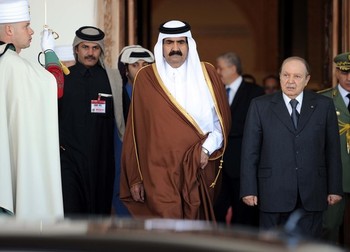INTERVIEW: Qatar large investments in Egypt and Algeria an “embarrassment” to Sudan
January 9, 2013 (WASHINGTON) – This week’s economic agreements worth billions of dollars between the energy-rich Gulf state of Qatar and the North African nations of Egypt and Algeria represents an “embarrassment” to the government in Khartoum, an economic analyst told Sudan Tribune today.
 The Emir of Qatar, Sheikh Hamad bin Khalifa al-Thani in his visit to Algiers on Monday signed energy, mining and industry agreements reportedly worth $5 billion.
The Emir of Qatar, Sheikh Hamad bin Khalifa al-Thani in his visit to Algiers on Monday signed energy, mining and industry agreements reportedly worth $5 billion.
Also on Tuesday the Qatari Prime Minister Sheik Hamad Bin Jassem Al Thani announced from Cairo that his country will loan Egypt an additional $2 billion and transfer another $500 million grant. This is an addition to $2.5 billion already deposited previously.
Last September Qatar said it plans to invest a total of $18 billion in Egypt over the next five years in tourism and industry projects along Egypt’s Mediterranean coast.
“This shows you the political weight countries like Egypt and Algeria enjoys in the eyes of Qatar,” said Khalid al-Tigani Elnour of the Elaff weekly newspaper who writes extensively on Sudanese economic issues.
“The [economic cooperation] does not reflect what appears to be strong relations between Sudan and Doha,” Elnour told Sudan Tribune by phone from Khartoum.
Qatar has been one of the few countries where Sudan enjoys relatively warm relations with. For years the rich Arab Gulf state has hosted peace talks between the Sudanese government and Darfur rebel groups which eventually resulted in signing of a peace accord in 2011.
It is also the main destination in foreign visits by Sudanese president Omer Hassan al-Bashir who is wanted by the International Criminal Court (ICC) for his alleged role in Darfur war crimes.
Sudan has been desperately seeking financial bailout from rich Arab Gulf states to plug the budget hole that resulted from the secession of the oil-rich South Sudan in July 2011. The newly independent state held three-quarters of the once-united country’s oil reserves.
The economic impact of Sudan’s partition translated into a sharp drop in national income, foreign currency influx and deteriorating value of the local pound which caused double digit inflation rates.
Inflation has accelerated to 46 percent in November, and the Sudanese pound has plunged on the black market where it now fetches around 7.00 pounds for one dollar, against more than four pounds late last year.
Last year Qatar announced that it will inject $2 billion of investments in Sudan including “the purchase of government bonds issued by the Sudanese government and investments in different sectors particularly mining, oil, agriculture and services”.
But Elnour said that out of the $2 billion promised by Doha only $500 million were actually disbursed.
“The Qataris asked for collateral [before they could release more money]. Khartoum offered several factories and projects,” he said adding that the two sides apparently could not reach an agreement.
The analyst also disclosed that Qatar in the past rejected financial bailout requests from Sudan.
As such Qatar’s investments in Egypt and Algeria should be seen as a testimony to how Doha views Sudan as an unstable state thus avoiding pumping money into its beleaguered economy.
Elnour also pointed out that the work on the Mushaireb residential project in Khartoum by Qatari Diar Real Estate Investment Company has come to a halt as the economic difficulties of Sudan compounded.
He stressed that this deterioration in the investment environment part of a wider problem of Sudan manifested in wrong political and economic policies, excessive bureaucracy and centralization of decision making.
By contrast Sudan’s eastern neighbor Ethiopia managed to attract $13 billion in investments from Saudi Arabia mainly in the agricultural sector, he said.
Elnour quoted previous remarks by the Sudanese president in which he said that Saudi businessmen who came to Sudan to explore opportunities for investments in food security projects were discouraged by the business environment they found.
The Saudi Arabian government itself has turned down pleas for economic assistance from Sudan even after official visits including one from Bashir last year.
Elnour said that Arab Gulf governments are discouraged from helping Sudan because of the political instability in the country as well as “wrong” policies undertaken by Khartoum.
He underscored that there are also other political considerations when these states evaluate the situation in Sudan.
“Some of these [Gulf] nations [privately] advised the Sudanese government to carry out reforms. Also a country like Saudi Arabia might not be happy about Sudan’s close ties with Iran and even Qatar,” Elnour added.
Elnour also pointed out to pressures by the United States on these Arab Gulf states and referenced testimony by the former U.S. envoy to Sudan Princeton Lyman before Congress last year.
Lyman said at the time that Khartoum’s allies namely China and the Arab countries should be convinced to press Khartoum on the humanitarian issue in return for financial assistance.
The U.S. official also claimed that some unnamed countries have recently “stopped giving Sudan considerable assistance”.
Gulf states were historically among the biggest investors in the country and have recently funded a improvement to Ruseiris dam, a large sugar plant and Sudan’s only shopping mall.
(ST)
